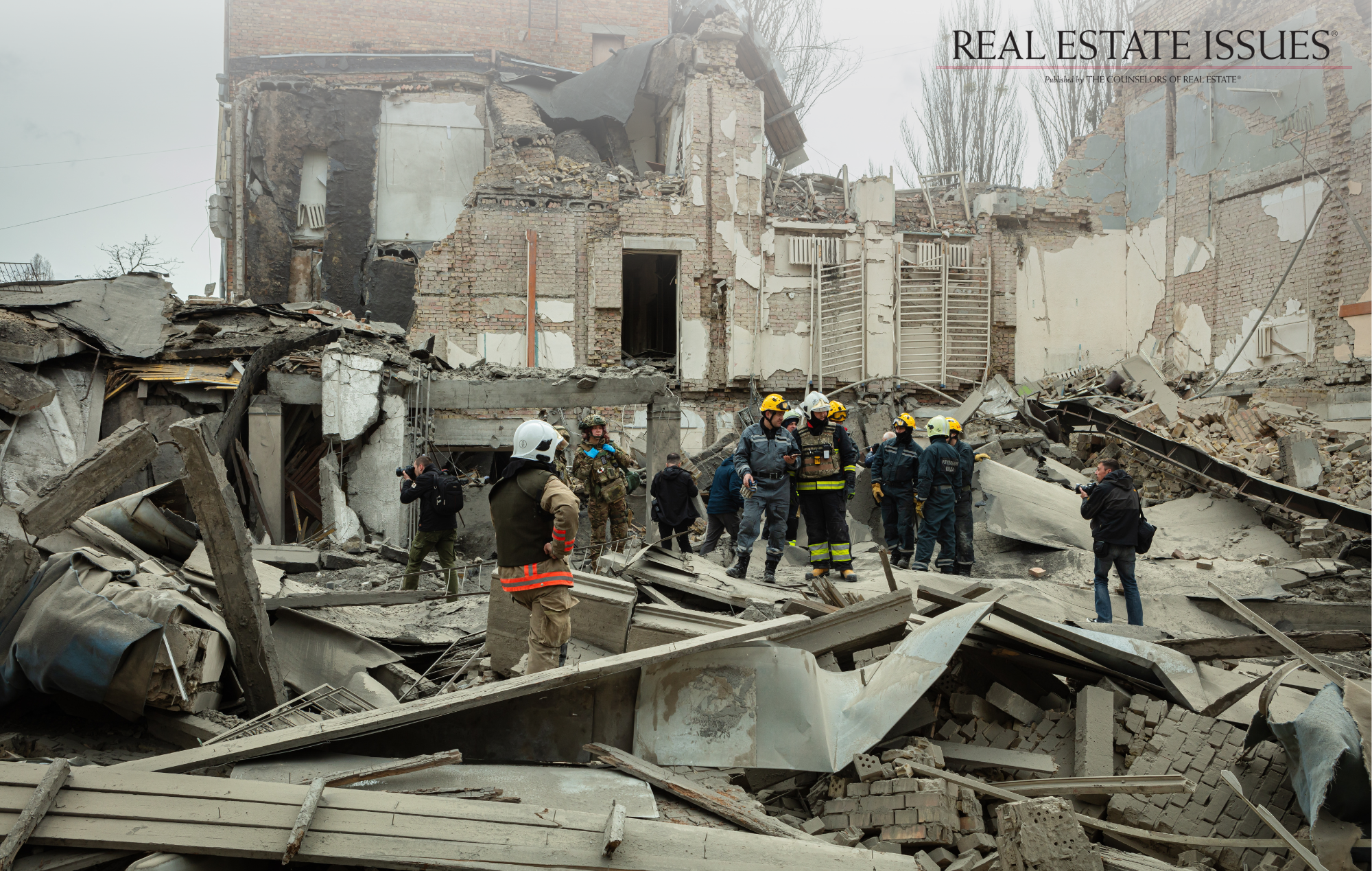As someone who has lived and worked through the destruction of a country, first hand seen the rebuilding of one country, Serbia, twice and seen the redevelopment of several other countries (Slovenia, Croatia, Montenegro, Bosnia and Herzegovina and North Macedonia) I feel compelled to give my thoughts on the rebuilding of Ukraine.
The war in Ukraine will come to an end, as all wars before have. We just don’t know the day that it will end and under what circumstances. What we do know is that Ukraine will have to be rebuilt, from the ground up and it will have to be rebuilt through foreign investments and foreign aid. Ukraine can’t do it by themselves.
Once that war comes to an end, the people of Ukraine will have high expectations and rightfully so. They will expect foreign investments and foreign aid. They will expect it in large amounts. A lot of damage has been done and a lot of money will be needed. Can those expectations be met? If not then to what extent? Those are the questions that both Ukraine and the world will have to answer, but with today’s economy, the answer is more than obvious and it is not one that will please the people of Ukraine. There just is not and will not, be enough money to go around and rebuild the entire country, all at once. It will take time and priorities will exist. In the end, the people of Ukraine will be let down, to a certain extent. Let’s just hope that the extent is small.
Harsh reality will set in. It will set in, in the minds of the people and in the minds of the politicians, the so-called decision makers. The harsh reality of having to rebuild the entire country, but not having enough money to do that. At that point difficult decisions will have to be made. Not all of those decisions will be popular, but will be necessary. Those decisions that will be made at that point in time, will affect, not only the people of Ukraine, but will affect the future generations of Ukraine, making them that much more important
So, who will be making the decisions? Who will be the one in charge? Who will be the one who says what will and what will not be rebuilt? There is no shortage of highly trained, qualified, professionals in Ukraine who are capable of rationally prioritizing what needs to be done and what can wait for a better day. The only question is, will these people be in a position to be making these difficult decisions or will this be left to a politician with little or even worse no experience or knowledge in these matters.
Drawing on my own personal experience, having lived and worked in a war-torn country that was once Yugoslavia and, in the end, all that was left of that country was Serbia. In Serbia I was able to see firsthand the rebuilding of a country, not once but twice. The first time was after the NATO bombings and the second time was after the fall of Slobodan Milosevic.
The first rebuilding of Serbia was very political in nature. The infrastructure and energy sector of the country had to be rebuilt, not everything was destroyed, but a significant amount of investment was needed to rebuild these two sectors. It was only logical that these two sectors be rebuilt. What happened elsewhere, on the other hand, was very often a political issue. Decisions on what should or shouldn’t be rebuilt were made based on political points and not rationale. It was more important for the politicians to have their pictures taken in front of „completed projects“, than to complete a project that was necessary, but less glamorous. Often projects were “completed” so that when the photos were taken, with the politicians, they would look completed, but underneath it all, was an uncompleted building with just a façade.
The second rebuilding of Serbia was conducted under a „buddy system“ which meant that the friends, “buddies“ of the politicians were the ones in charge. The result of using a “buddy system” was that decisions regarding the rebuilding of Serbia were often made taking into account personal or business interests of politicians and their “buddies.”
This can also happen in Ukraine, only there it can be much worse, since it can be a case of both political decision making, so that the government can collect political points, instead of serving the interests of the country, but also a „buddy system“ can be in place working in their own interest. Solving this problem is easy and difficult at the same time. Difficult, because no matter how hard you try and no matter what you do, you can’t solve it 100%. Easy, because all it takes is preparations. Prepare now during wartime for what comes in peace. That is all it takes.
Some may think that it is too early to even begin thinking about what will happen in Ukraine after the end of the war. It is never too early, the earlier the government starts, the better the outcome. Much damage has been done, even more will come, but there is a clear picture today, of what will need to be rebuilt tomorrow.
Who will be the one preparing Ukraine for the rebuilding that will come? This is probably the most important question that should be addressed in the near future, because everything depends on that answer. Somebody, a group of people, will have to take a good, long, hard look at the destruction in Ukraine and decide what will first be rebuilt, what second and what will have to wait for a better day. It will come down to that. Those people, who have been put in charge, will have to make those decisions rationally and not emotionally, but each one of those people will have some building, bridge or road, that has been destroyed, that they are emotionally attached to. Some of them will have been born in a village that does not exist anymore, because it has been flattened to the ground. Others will have an emotional connection to a school, a theater or something else that has to be rebuilt, but doesn’t exist anymore. No matter what it is, they all will have an emotional connection to something. That is only natural, after all, we are all human beings, we have feelings. Besides all of that, they will have to put it aside and make the right decision. They will have to decide which hospital must be rebuilt, which road fixed, which bridge built, which power station renovated. They will have to decide on how to house the homeless, how to heat their homes and we all know what winter can look like. They will have to do all of that, without ever even thinking about fixing the school that they went to in childhood or rebuilding their favorite theater. That is what will await those people. These are the decisions that they will have to make.
In Serbia, after the fall of Slobodan Milošević, a process of decision making began. The first thing that the Serbian Government undertook was the completion of what is called a „White Book“. This was more of a report than a book. It was a sum of short, 2-to-4-page reports, on what the authors of the report thought should be done in the reconstruction of Serbia. I had the opportunity to read the White Book and in my professional opinion, this was nothing more than a wish list. Even though almost 20 years have passed, the mistakes resulting from the „White Book“ remain with us today. Needless to say, the „buddy system“ was in place during the writing of the „White Book“
Hopefully this is something that the Ukraine Government can avoid or try to avoid and the only way to do that is if professionals are the ones making the decisions and not politicians.
Let’s assume that the Ukraine Government takes all necessary steps and is well prepared for the rebuilding of the country. After that, construction begins and corruption follows. Ukraine is a former Communist country, as such, corruption is commonplace, it is everywhere. It takes generations to filter out. Once the Berlin wall fell, many of us thought that change would come swiftly and thoroughly, instead we are still talking about corruption in former communist countries. It is difficult to eliminate and unfortunately it takes years, even generations. Ukraine is no different.
Money will come into the country in several ways, through foreign investments and through foreign aid. The aid will probably come in the form of money, sent directly to the Ukraine Government, for certain projects. From there, the government will hire companies to complete the work. Sometimes, when money is sent to the Ukraine Government, either by a foreign company or a foreign government, they will include requirements that the Ukraine Government must engage certain companies from those countries. This will not always be the case, but often will. Foreign governments have these requirements for two reasons, to provide work to companies from their own country, which is something every government should do and to try and minimize corruption. In cases where there are no restrictions, corruption may be more widespread, since there will be a lower threshold in monitoring the money.
In the case where money comes in the form of foreign investments the situation should be much clearer. Internally, these companies will have their own mechanisms to battle corruption, but the problem arises in the process where these companies will be interacting with the Ukraine Government on a more local level. There, at that level everything has a price. Taxes, permits, everything.
Do you remember what Deep Throat said to Robert Redford in the movie „All the President’s Men“? Follow the money.
The same will hold true in Ukraine. Follow the money. That will be the only way to battle the corruption that will undoubtedly be present. If the question before was, who makes the decisions in the preparation phase, the question now is, who will follow the money.
The Ukraine Government will have to hire people with integrity, character and knowledge to be able to do the job that they were hired to do, and that is “follow the money.” This is the only way the government will be able to battle and control corruption.
This will begin even before contracts are signed. It will begin in the procurement phase, followed up by going over the contracts and then all phases of construction. Quality and quantity of works, prices and guarantees, all have to be monitored before the final handover of the project.
It is not as bad as I have made it sound. There will be problems, most of them will be solvable, there will be corruption, but it can be controlled, bad decisions will be made and we can make the best of them, but the ultimate award will be working with the people of Ukraine. They will have high expectations and rightfully so, but they will back up those expectations by going well above and beyond their job descriptions. They will do all that they can to help in the completion of whatever project they are involved in and they will have an opinion on all other projects, that they have no idea what they are about and they will let you know it. In the end you will end up working with some of the friendliest people you have ever met, it’s in their DNA:
I had the privilege of attending a meeting with John Hentschel, our First Vice Chair. This was back in 2013, I believe, I am not sure of the year. The meeting was in Belgrade, Serbia with a local investor who wanted to develop the Belgrade Harbor. John has vast experience in developing these types of projects, since he helped develop the Baltimore Harbor. As an expert on this topic, the investors went out of their way to set up the meeting. Once the meeting started, John shared his past experience working on the Baltimore Harbor. There was a lot of information being floated around by John, as he basically explained just about everything important regarding such a project. Since the meeting was not being recorded or filmed, the employees attending the meeting were busy trying to write down every single word John said. I was listening to John talk, but with the other eye I was watching the employees trying, unsuccessfully, to write everything down. None of them knew shorthand, so they were scribbling down words, in hope that they would be able to decipher, after the meeting, what they wrote down.
At one point, the woman running the meeting said that she only wishes that her superiors were here to listen to John. The meeting continued on, as John explained what exactly would happen once the project took off. During the meeting, at some point she asked John a question,
What is the difference between a consultant and a counselor?
John brilliantly answered that question, in a few short words, when he said
A consultant tells you what he thinks, a counselor tells you what to do.
Unfortunately, the project never took off. Politics got in the way
If anybody is still asking themselves, what can we, as CRE members, do to help the people of Ukraine. I believe that John answered that question some ten years ago in Belgrade.


 @kibri_ho/Shutterstock.com
@kibri_ho/Shutterstock.com



